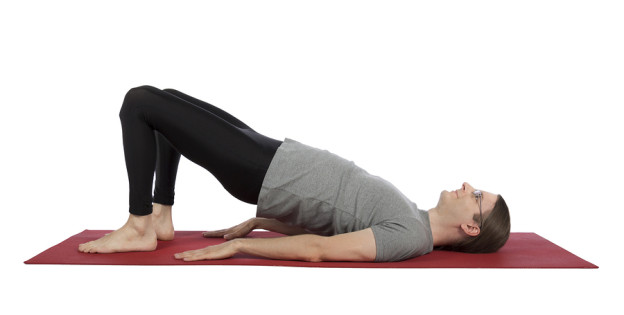By David Blyweiss, M.D., Advanced Natural Wellness
March 2, 2020
When I talk about staying physically active and getting regular exercise, a lot of folks say “Doc, I’d love to but can’t. I have a bad back.”
Well, I’ve got news for you…
You might not have a bad back. You might have a bad front! Let me explain.
You see, many of my patients are talking about lower back pain. For them, too much movement – walking, bending and so forth – tends to aggravate it. In some cases it’s sporadic. It comes and goes. In other cases, it’s chronic. Seems like no matter what they do, their back always hurts.
In most short-term cases, back pain is likely caused by muscle strain. But what if your back pain is chronic?
MD Exposes the Hidden Danger to Your Eyes

When your eyesight starts to fail, it's a real problem. Suddenly you can't go to the grocery store... you can't get to the doctor if you have an emergency... you can't meet your friends for dinner…
Your "regular" doctor doesn't have time to keep up with the latest research. And the same goes for eye doctors. They go to school to learn how to fit you for glasses and contacts, but have no way of preventing the damage and loss of eyesight that threatens your freedom and independence.
Let me show you something that explains a LOT about how your eyes work.
In my FREE Special Report, I'll show you a HUGE, untapped resource for your eyes that safely and naturally restores clear, effortless eyesight.
Click here to get started...
Chances are good your doctor has put it off to something in the line of disc degeneration, arthritis or a bulging disc. Or maybe he’s never given you a definitive cause.
But Does Spinal Degeneration REALLY Cause Back Pain?
Well, here’s a little bit of news for you.
The bulk of people who show age-related spinal degenerations on MRIs and CT-scan don’t have symptoms of chronic low back pain at all. In fact, as many as 90% or more of people in the last decades of their lives have disc degeneration – including osteoarthritis in the lumbar joints – without low back pain!
So if loss of spinal integrity isn’t the problem, what is?
Well, your spine is supported by a group of core muscles that create a “corset” around your belly and lower back. These muscles support your spine every time you sit, stand, bend, lift or stretch.
If you regularly throw your back out when doing any of these activities, it’s a sure sign your core muscles are getting weak. And if you’ve already reached the point where back pain keeps you from doing these same activities, chances are you have very little muscle strength left at all.
The World's Quickest Solution for Ending Prostate and Urinary Misery
This has recently been revealed to be one of the only real breakthroughs in prostate health.
The seeds of a strange fruit (sometimes called "Chinese Apples") hold powerful phytonutrients that are a revolution in prostate health.
In fact, UCLA and Veterans Administration research have now proved this to be true.
Not only that, but it may be the worlds quickest solution for ending prostate misery.
Simply stated, these phytonutrients represent a huge step beyond beta sitosterol, saw palmetto, and other phytosterols alone.
Simply click HERE if you want to have fast prostate relief...restful, uninterrupted sleep...no more constant "urges to go"...enhanced virility...and optimal prostate support for life.
And when you’ve got an extra 40 or 50 extra pounds of fat in your abdomen… well, you’re pulling things the wrong way. Your body is recalibrating and trying to get you back into the position you need to be and it pulls your back.
It’s not your disc bulging. It’s not your vertebrae. It’s a weak set of core muscles that are not properly supporting your back.
Here’s How to Heal Your Bad Back
The key, then, is to build up those core muscles and keep them strong throughout your lifetime. The best way to do this is to perform exercises to build strength in these muscles.
Now, this isn’t a replacement for a regular workout that gets your heart and lungs pumping. It’s strictly for the purpose of putting a halt to your back problems.
- Stretch your back. Start with a few stretches to loosen up your back muscles. Lay down flat, bend your right leg at the knee and bring it in toward your chest. Use your hands to press the knee as far into your chest as possible. Hold for a count of ten and release. Repeat on left leg. Do this 3 or 4 more times.
- Bridge Exercise. Lie flat with your legs bent, feet flat on the bed or floor and your arms straight/flat at your sides. Exhale, tighten your abdomen and lift your rear-end upward. Hold for a few seconds, then release your abdomen and return to starting position. Repeat 10 times.
- Plank Exercise. Lay face-down. Bend your elbows at your sides and tuck them closely to your body. The outside of your forearms should be flat to the ground, and your hands will be near your neck. (Or you can lock your hands in a fist under your neck, which will give you a little more stability.)
Tighten your abdomen and then, in a push-up motion, raise your body off the floor using your forearms and toes. (You can use the knees instead of toes if you need additional support).
Your hips and stomach may try to sag, but keep them as straight as possible and hold for a count of 10. Repeat three to five times.
- Bird Dog Exercise. Get on your hands and knees. Tighten your abdomen. Then extend one arm straight in front of you while extending the opposite leg to the rear. Hold for a count of ten, then release your abdomen and return to starting position.
Alternate sides for a total of 10 (five on each side). Rest, then do two more sets.
Do a few back stretches again afterward to keep your muscles from tightening.
If you feel a little sore afterward, apply a topical capsaicin cream on your lower back. Look for a maximum-strength formula that contains 0.75% capsaicin. I like roll-on formulas, so you can apply it exactly where it’s needed without getting it all over your hands or in your eyes.
Another issue affecting your back could be lack of blood flow. When oxygen-rich blood flows readily into your back muscles it heals damage to keep the tissues healthy and firing. That’s why I practice mindful breathing every single day.
And as always, talk with your doctor before starting an exercise program. If some of these are a little too difficult for you, he’ll be able to recommend an easier routine to help you get started.
SOURCES:
Eno JJ, et al. The prevalence of sacroiliac joint degeneration in asymptomatic adults. J Bone Joint Surg Am. 2015 Jun;97(11):932-6.
Brinjikji W, et al. Systematic literature review of imaging features of spinal degeneration in asymptomatic populations. AJNR Am J Neuroradiol. 2015 Apr;36(4):811-6.
Kalichman L, et al. Facet joint osteoarthritis and low back pain in the community-based population. Spine (Phila Pa 1976). 2008;33(23):2560.







